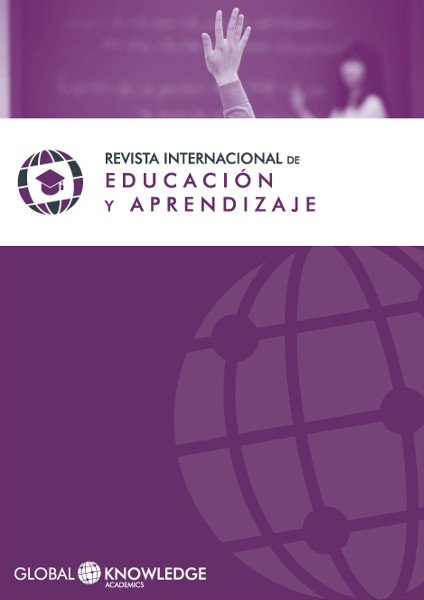Design of a Competence Questionnaire in Information for University Students
DOI:
https://doi.org/10.37467/gka-revedu.v6.1602Keywords:
Information competences, College, Questionnaire, EvaluationAbstract
The objective of this work is to analyse the development phases of a selfperception questionnaire for university students about their information competences, the questionnaire is developed from a Model of Indicators of competences in information for learning and research of university students in Mexico, that was conducted in a doctoral research. Likewise, the consistency of the questionnaire is measured to determine its reliability and a statistical analysis of the results is performed. The questionnaire, according to the results, is a tool that can be considered for its application in students of anthropology or related areas.
Downloads
Global Statistics ℹ️
|
561
Views
|
1398
Downloads
|
|
1959
Total
|
|
References
Cameron, L., Wise, S. L., & Lottridge, S. M. (2007). The Development and Validation of the Information Literacy Test. College & Research Libraries , 68(3), 229–237. https://doi.org/10.5860/crl.68.3.229 DOI: https://doi.org/10.5860/crl.68.3.229
Catts, R. (2005). Information Skills Survey Technical Manual. Australia: CAUL.
Emmett, A., & Emde, J. (2007). Assessing information literacy skills using the ACRL standards as a guide. Reference Services Review, 35(2), 210–229. https://doi.org/10.1108/00907320710749146 DOI: https://doi.org/10.1108/00907320710749146
Gross, M., & Latham, D. (2009). Undergraduate Perceptions of Information Literacy: Defining, Attaining, and Self-Assessing Skills. College and Research Libraries, 70, 336–350. DOI: https://doi.org/10.5860/0700336
Head, A. J. & Eisenberg, M. (2010). How College Students Evaluate and Use Information in the Digital Age Projecto Infor-mation Literacy Progress Report. The Information School, University of Washington: Macarthur Foundation. DOI: https://doi.org/10.2139/ssrn.2281485
Marchis, G. P. (s/f). La validez externa de las encuestas en la “web” .Amenazas y su control. Estudios sobre el Mensaje Periodístico, Vol 18(Número especial (octubre): La enseñanza de la Comunicación en el Espacio Europeo de Educación Superior (EEES)), 263–272. https://doi.org/http://dx.doi.org/10.5209/rev_ESMP.2012.v18.40980 DOI: https://doi.org/10.5209/rev_ESMP.2012.v18.40980
Marzal M. A. (2010). Evaluation of Information Literacy Programmes in Higher Education: Strategies and Tools. International Journal of Educational Technology in Higher Education, 7(2), 26-36. doi: 10.7238/rusc.v7i2.979 DOI: https://doi.org/10.7238/rusc.v7i2.979
Marzal, M.A. y Pisté, S. (2014). The Future of Information Literacy in Higher Education: Evaluation Models and Indicators. En Information Literacy Section Satellite Meeting IFLA (International Federation Library Association) , Facing the Future: Librarians and Information Literacy in a Changing Landscape (pp. 1–11). Limmerick, Ireland: Information Literacy Section Satellite Meeting IFLA (International Federation Library Association).
Miller, C. (2016). TRAILS: Tool for Real-time Assessment of Information Literacy Skills. The Charleston Advisor, 17(3), 43-48. doi: 10.5260/chara.17.3.43 DOI: https://doi.org/10.5260/chara.17.3.43
Pisté S. (2015). Evaluación de competencias en información para el aprendizaje y la investigación en universidades mexicanas. Universidad Carlos III de Madrid. Recuperado a partir de http://e-archivo.uc3m.es/handle/10016/21201#.WOAxmfxxu7I.mendeley&title=Evaluación de competencias en información para el aprendizaje y la investigación en universidades mexicanas
Podgornik, B. B., Dolničar, D., Šorgo, A., & Bartol, T. (2016). Development, testing, and validation of an information literacy test (ILT) for higher education. Journal of the Association for Information Science and Technology, 67(10), 2420–2436. https://doi.org/10.1002/asi.23586 DOI: https://doi.org/10.1002/asi.23586
Wang, H.-C., & Doong, H.-S. (2010). Nine issues for Internet-based survey research in service industries. The Service Industries Journal, 30(14), 2387–2399. https://doi.org/10.1080/02642060802644926 DOI: https://doi.org/10.1080/02642060802644926
Downloads
Published
How to Cite
Issue
Section
License
Those authors who publish in this journal accept the following terms:
-
Authors retain copyright.
-
Authors transfer to the journal the right of first publication. The journal also owns the publishing rights.
-
All published contents are governed by an Attribution-NoDerivatives 4.0 International License.
Access the informative version and legal text of the license. By virtue of this, third parties are allowed to use what is published as long as they mention the authorship of the work and the first publication in this journal. If you transform the material, you may not distribute the modified work. -
Authors may make other independent and additional contractual arrangements for non-exclusive distribution of the version of the article published in this journal (e.g., inclusion in an institutional repository or publication in a book) as long as they clearly indicate that the work was first published in this journal.
- Authors are allowed and recommended to publish their work on the Internet (for example on institutional and personal websites), following the publication of, and referencing the journal, as this could lead to constructive exchanges and a more extensive and quick circulation of published works (see The Effect of Open Access).













